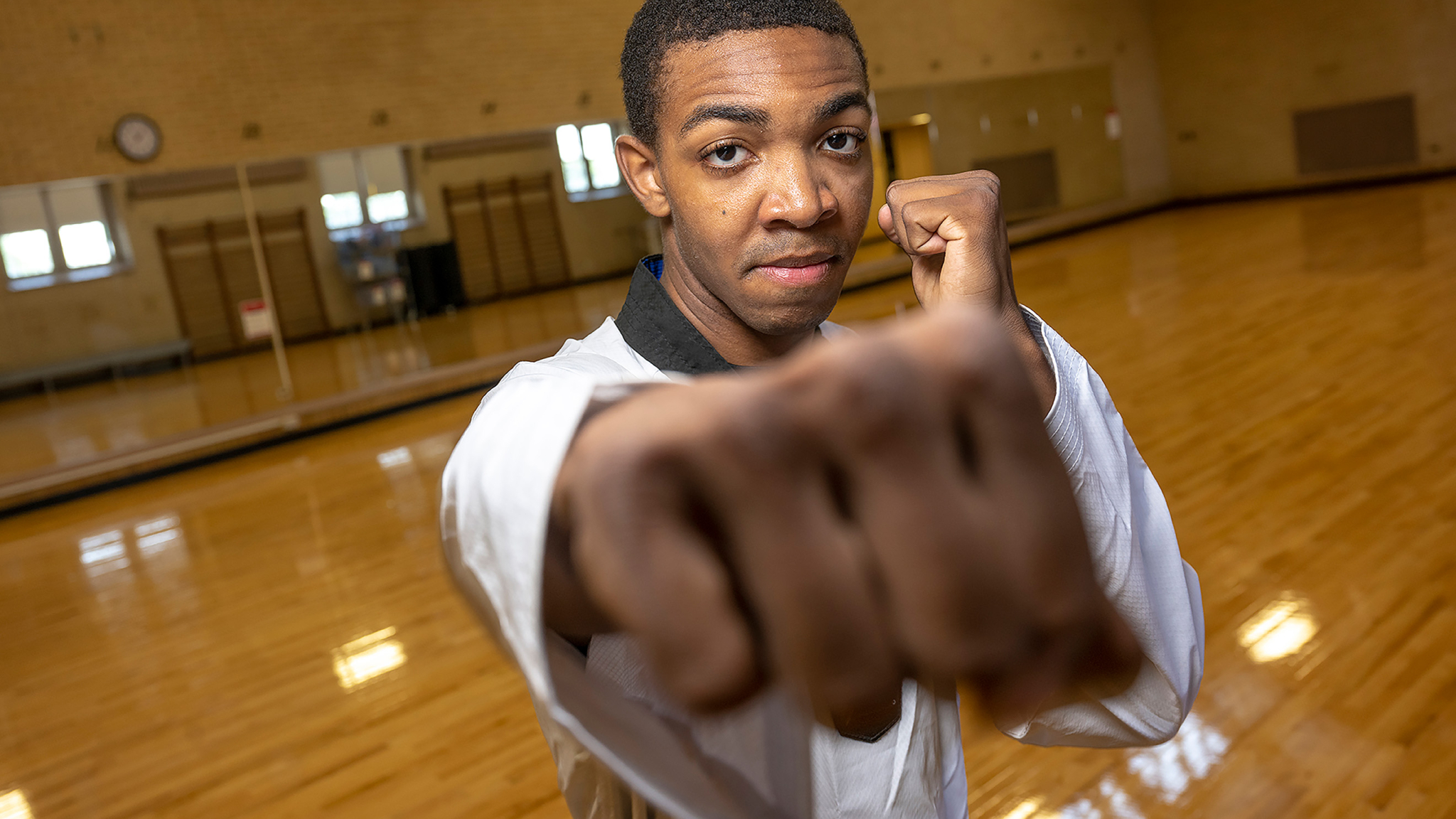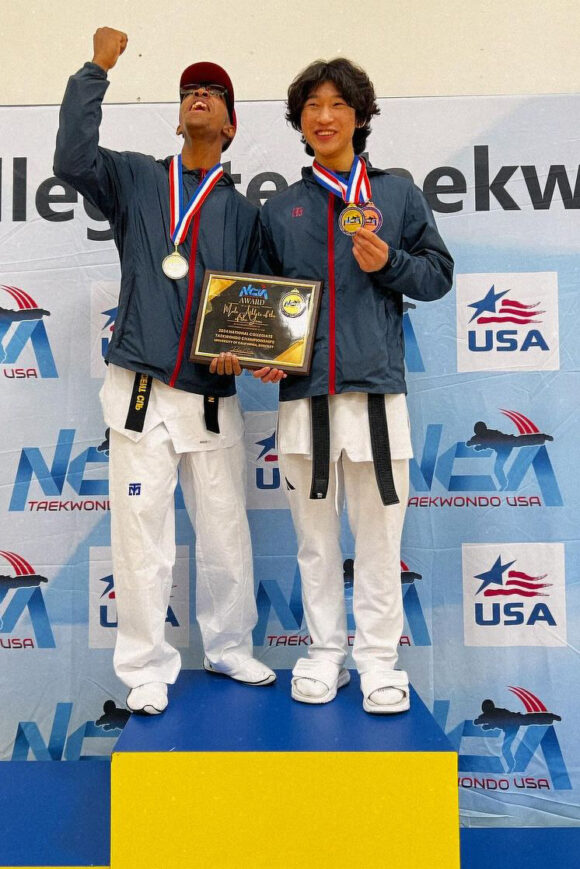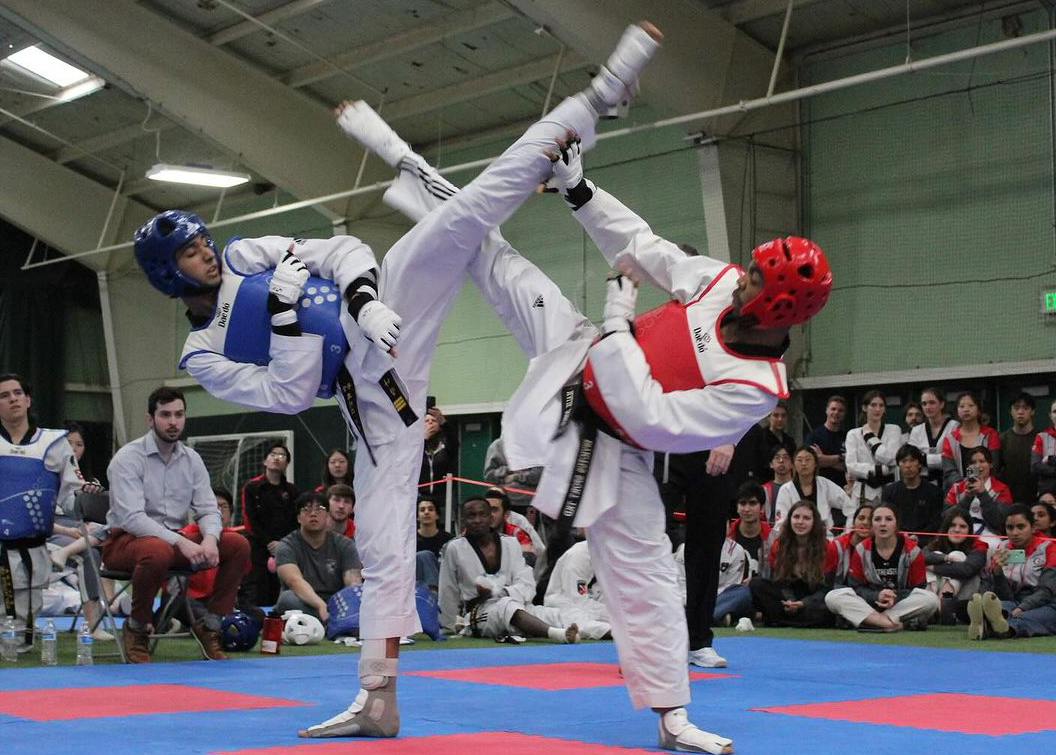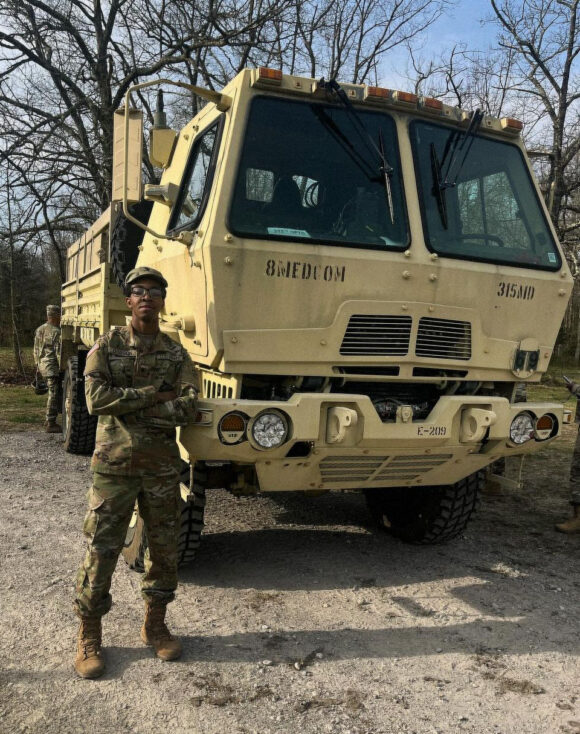
Malik Dobson was recently named the Male Athlete of the Year at the 2024 National Collegiate Taekwondo Association. Photo: Nick Romanenko.
Since before he was in grade school, Malik Dobson has been kicking and sparring in taekwondo matches, but perhaps the sweetest win for the 24-year-old Rutgers student came in April during a national collegiate competition.
Dobson was named the Male Athlete of the Year at the 2024 National Collegiate Taekwondo Association (NCTA) Championships, held at the University of California Berkeley from April 12-14. The recognition came as a surprise to Dobson, and he nearly missed the announcement as he was tending to an injured teammate. A friend called him on his cell phone.
“‘They just called your name! You got Athlete of the Year!’ And I was like, ‘There’s no way!’” recalled Dobson, who competed as a featherweight and took gold after five fights against different opponents representing various universities around the country.
Dobson, who is studying nutritional sciences with a concentration in dietetics at the School of Environmental and Biological Sciences, is entering his senior year and on track to graduate in spring 2026. He currently serves in the U.S. Army as a reservist and is scheduled for deployment in the fall.

Rutgers students Malik Dobson, left, and Ian Hong at the 2024 National Collegiate Taekwondo Association Championships held in April in California.
Courtesy of Malik Dobson.
“I love the culture of taekwondo. It’s very much similar to the military culture,” said Dobson, who is also a manager at Rutgers Veterans House. “It’s about things like respect, discipline. A lot of military values were instilled in the program as you move through the belt ranks. That’s where I fell in love with it and continue doing it.”
Dobson’s teammate Ian Hong, who is also the captain of the Rutgers Taekwondo Sports Club, brought home gold in team trials, qualifying him to represent Rutgers at the international competitions in Colombia in November.
Jamil Ghanem, who coaches the Rutgers taekwondo club members, nominated Dobson because he is balancing schoolwork with his Army obligations while participating in the club practices and competitions.
“I love his energy and his attitude with helping others,” said Ghanem, a Rutgers alum who runs Fit Kicks Martial Arts in South Brunswick. “He’s a dying breed. He’s done so much but he’s so humble, so approachable, so likeable and helpful especially to beginners. He never tries to show off or one-up someone.”
Dobson was selected as Athlete of the Year because of his dominant performance at the tournament, his sportsmanship and continued support for his club at Rutgers, said NCTA President Dan Chuang, who also serves as the head coach of Sport Taekwondo Club at Massachusetts Institute of Technology (MIT).
“He won all of his matches by wide margins, but he also displayed outstanding sportsmanship,” said Chuang, who is an instructor with MIT’s department of athletics, physical education and recreation. “In some early matches his experience far outstripped his opponent’s experience and he showed outstanding control in these situations. Additionally, he is deeply involved in his collegiate taekwondo club at Rutgers, representing them in the Eastern Collegiate Taekwondo Conference five times this year, really showing his commitment to being a true collegiate student athlete representing his school.”
Taekwondo is a martial arts sport similar to karate, but taekwondo involves kicking, jumping and spinning whereas karate uses the hands.
When he was 6, Dobson’s mother signed him up for classes at Shim’s Martial Arts Academy near their Elizabeth home. She wanted him to have something to do; he liked the sport for its kicking component.
“I was really competitive even at a young age,” he recalled. “My mindset was I want to do this technique better than this guy; I want to kick higher than that guy.”

Malik Dobson, right, cancels his opponent’s kick during the Eastern Collegiate Taekwondo Conference earlier this year. Courtesy of Malik Dobson.
He stuck with the sport, learning under the tutelage of Oscar Alfaro, going through the belt ranks, eventually becoming a second-degree black belt. He began to compete nationally in sparring at 15 with Richard DeGeorge of Invictus Taekwondo in Union, as his instructor. By 18, Dobson was competing in the adult divisions, even entering international bouts. That’s when he started to get noticed. In 2017, he competed in the Taekwondo-Canada Open in the senior division of his weight class, bringing home the gold. That led to sponsorships that allowed him to compete in China, where he again medaled.
Soon, USA Taekwondo, the organizing committee that finds and recruits athletes to compete in the Olympics, was interested in him. Dobson was on the Olympic path. He put college on hold for a couple of years while he continued competing.
“I was doing taekwondo for a long time but then I started to think about life and the future, and my priority was becoming more for my future stability, my job and an academic career,” he said.

Malik Dobson, who is studying nutritional sciences at the School of Environmental and Biological Sciences, is also an Army reservist. Courtesy of Malik Dobson.
At 20, Dobson decided to stop competing and pursue his education. In 2021, he received his associate degree in biology from Union Community College and then joined the U.S. Army. He came to Rutgers in fall 2022 and soon after discovered there was a Taekwondo sports club on campus.
“I was looking for something I could get into where it wasn’t just classes, beating myself over the head trying to figure out calculus,” he said. “I wanted to do something else.”
There are about 55 club sports at Rutgers-New Brunswick and taekwondo, with about 70 members, is one of the largest and most active. Though it is open to anyone at any skill level, members get a chance to compete nationally, representing Rutgers. Club members raise funds to pay for uniforms, equipment and travel fees for competitions. The funds are matched by the university with a limit of $5,000.
The club selects its top members to compete in the Eastern Collegiate Taekwondo Conference, which is the organizing body for collegiate taekwondo clubs at schools mostly on the East Coast, including Rutgers, Harvard, Princeton and New York universities. The national collegiate championship followed in April. Ghanem added that the club can also certify members in black belt.
“He has an old-school martial arts respect, which is rare,” said Ghanem, who has coached the club since 2018. “It doesn’t matter where you’re from, it’s your character. It comes from within. We say that about the belt. The belt doesn’t do the kicks for you, doesn’t behave for you. The weapon doesn’t do the fighting. It’s the practitioner. It’s not the style, it’s not the Army, it’s the person.”
This article first appeared in Rutgers Today.

